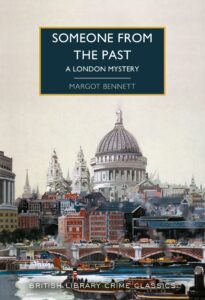I’m a little bit jealous of Someone From the Past – it came out in 1958, the same year I did, yet it remains fresh, vital and contemporary, unlike some of us of a similar age. What I like most about it is the vivid voice of the narrator, Nancy, who is snarky, calculating, confused and altogether real. One evening her estranged former best friend Sarah approaches her unexpectedly and tells her that ever since she announced her engagement to her ultimate prize, a corporate director, she’s received letters threatening to kill her, apparently from an ex-lover. When she’s killed the next day, that list of exes becomes a list of suspects.
Much of English fiction, mystery or literary, revolves around class distinctions and there is certainly a great deal of close, satirical observation here. As children of the streets, Nancy and Sarah are subversive to the carefully calibrated social system.
We had no social background. It wasn’t merely that we lacked a rich or respectable background. We had none at all.
This lack of definition, as well as a certain sexual freedom and Sarah’s alluring beauty allow for a varied list of suspects. There’s Peter, her first relationship, a shady character from a similar origin, who emerges from prison from time to time to thoroughly upend her life.
He put on the old three-quarter grin that would have been a whole grin only if he had a chance to hit a policeman with a bottle.
Laurence, on the other hand, is a married, nerdy editor at the publishing house the women worked at, who begins to teach them about the finer things in life.
He was a great reader-aloud. He had this idea that literary people have, that enjoyment can be communicated by the roundly-rolled-out-word.
He begins an affair with Sarah, surrendering his marriage and his job for her, only to become a pathetic alcoholic when she dumps him for Mike, a hilariously self absorbed second rate actor. Nancy had been the de facto president of his fan club, but when he meets Sarah he’s besotted, and actually marries her, a union that dissolves when Peter turns up yet again.
Donald is the last name on the list, an upper class twit and putative painter, who shot himself when Sarah left him. Hapless as ever, he failed in the attempt, but aroused the protective love of Nancy. Which is lucky for him, because he’s the most obvious suspect, and the infatigable Nancy puts herself under suspicion in her attempts to shield him.
Her efforts to clear herself, protect Donald and solve the case lead her to madly careen around London, avoiding the police and questioning the suspects.
The first thing I wanted was a sensible working arrangement between myself and my brain, the second thing was a brain.
I loved Nancy’s sharp observations, and the sheer kinetic energy of her frantic pursuits. Her pathway is unpredictable and compelling, leading to a resolution of both the crime and her love life. There’s also a lot between the lines about the class system and the second class position of women in mid century England. I found this to be a truly superior and entertaining mystery, and give credit to the Poisoned Pen Press for republishing it as part of their British Library Crime Classics series. I’ll give Nancy the last word.
I didn’t think I was turning into a pathological liar, but I had to keep in practice, for the police. — Jamie Agnew
